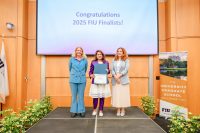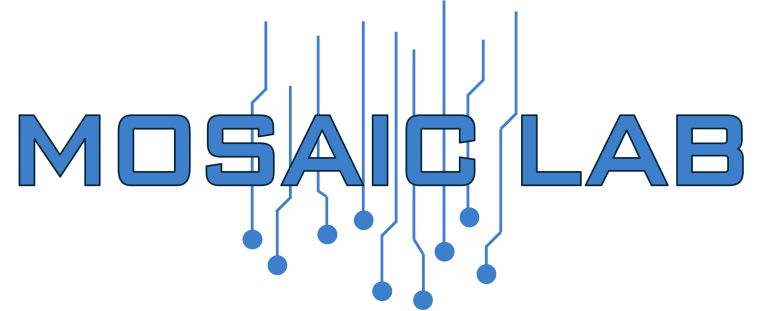- MOSAIC Lab Member Receives Google CAHSI Dissertation Award
 Rahmina Rubaiat, a Ph.D. candidate from the MOSAIC Lab at Florida International University (FIU), has been awarded the 2025 Google CAHSI Dissertation Award. This competitive honor recognizes exceptional doctoral research and academic excellence among students at Hispanic-Serving Institutions. Rahmina’s dissertation, “Speech-Based Concussion Detection and Recovery Tracking Using Deep Learning,” focuses on developing explainable AI models to identify and monitor concussion through speech analysis. Her work… Read more: MOSAIC Lab Member Receives Google CAHSI Dissertation Award
Rahmina Rubaiat, a Ph.D. candidate from the MOSAIC Lab at Florida International University (FIU), has been awarded the 2025 Google CAHSI Dissertation Award. This competitive honor recognizes exceptional doctoral research and academic excellence among students at Hispanic-Serving Institutions. Rahmina’s dissertation, “Speech-Based Concussion Detection and Recovery Tracking Using Deep Learning,” focuses on developing explainable AI models to identify and monitor concussion through speech analysis. Her work… Read more: MOSAIC Lab Member Receives Google CAHSI Dissertation Award - Sajad Farrokhi Successfully Defends PhD Proposal at Florida International University
 Sajad Farrokhi, a PhD student in Computer Science at Florida International University and a member of the MOSAIC Lab, has successfully defended his PhD proposal titled “AI-Driven ECG Analysis: Leveraging Large Language Models and Sensor Fusion for Enhanced Cardiovascular Monitoring.” His research focuses on using artificial intelligence to better understand heart activity by combining data from wearable sensors. The goal is to develop a smart,… Read more: Sajad Farrokhi Successfully Defends PhD Proposal at Florida International University
Sajad Farrokhi, a PhD student in Computer Science at Florida International University and a member of the MOSAIC Lab, has successfully defended his PhD proposal titled “AI-Driven ECG Analysis: Leveraging Large Language Models and Sensor Fusion for Enhanced Cardiovascular Monitoring.” His research focuses on using artificial intelligence to better understand heart activity by combining data from wearable sensors. The goal is to develop a smart,… Read more: Sajad Farrokhi Successfully Defends PhD Proposal at Florida International University - MOSAIC Lab Member Wins Second Place in 3MT Competition
 Rahmina Rubaiat, a graduate student from the MOSAIC Lab at Florida International University (FIU), secured second place in FIU’s Three Minute Thesis (3MT) competition. Their presentation, “Speech as a Biomarker for Concussion”, showcased their ability to communicate complex research concisely and effectively. The 3MT competition, hosted by FIU’s University Graduate School, challenges students to present their thesis in just three minutes to a general audience.… Read more: MOSAIC Lab Member Wins Second Place in 3MT Competition
Rahmina Rubaiat, a graduate student from the MOSAIC Lab at Florida International University (FIU), secured second place in FIU’s Three Minute Thesis (3MT) competition. Their presentation, “Speech as a Biomarker for Concussion”, showcased their ability to communicate complex research concisely and effectively. The 3MT competition, hosted by FIU’s University Graduate School, challenges students to present their thesis in just three minutes to a general audience.… Read more: MOSAIC Lab Member Wins Second Place in 3MT Competition

The MOSAIC (Mobile Sensing and Analytics) Lab at Florida International University (FIU) investigates how mobile, wireless, and wearable computers and sensors can be used to address many pressing problems in areas such as healthcare, conservation, transportation, education, and more. Our lab studies a variety of sensing challenges, such as how to design participatory and opportunistic data collections at large scales and over long period of times, how to fuse many different sensing modalities, how to use context information to increase the sensing efficiency and the quality of the collected data, and how to do all that in a secure and privacy-conserving manner. From an analytics perspective, we use the collected data to obtain insights into user behavior and to provide opportunities for the early detection of various diseases and to monitor disease progression or patient recovery. We also investigate how to use the insights obtained from the sensor data to to develop new solutions in areas such as smart cities, smart transportation, and wireless communications. Our work also investigates how to develop machine and deep learning techniques that can provide timely decisions and outputs on resource-constrained and distributed systems.